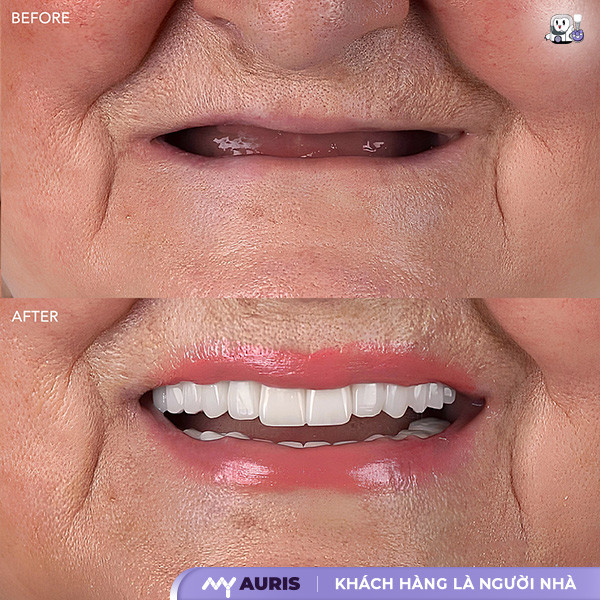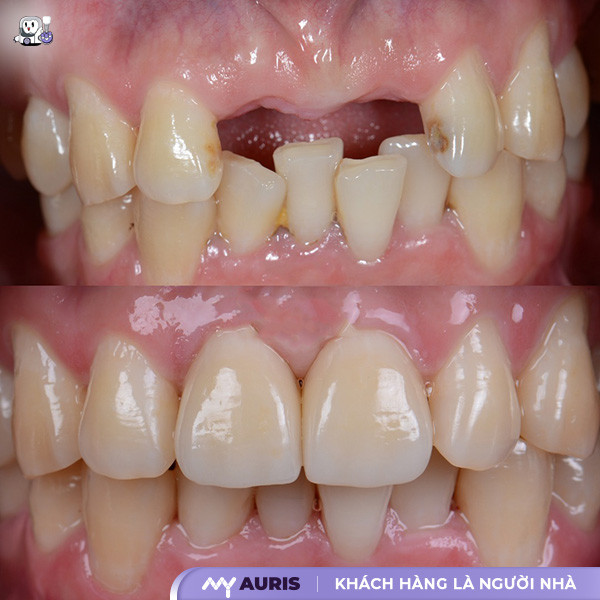Long-term tooth loss, whether one or multiple teeth, reduces chewing function, affects eating, makes patients hesitant to speak and smile, and causes self-consciousness in communication. So, can long-lost teeth be replaced? The answer is yes, through dental implant procedures. However, the possibility of tooth replacement depends on many factors.
Can Long-Lost Teeth Be Replaced?
The answer is: yes, teeth can be completely replaced even after long-term loss. Thanks to the development of modern dental technology, methods for restoring long-lost teeth are increasingly diverse and effective. Here are 3 common solutions currently applied:
Dental Implants: Dental implant surgery is the most advanced restoration method, helping to sustainably replace one or more missing teeth. This method extends tooth lifespan, restores chewing function like natural teeth, achieves high aesthetics, and does not affect adjacent teeth. However, high cost, lack of insurance coverage, and a long recovery period (often several months to a year) are factors to consider.
Removable Dentures: Although not the most ideal tooth replacement method, removable dentures are still chosen by many due to their easy removal for cleaning, and flexible repair and replacement options. However, the limitations of this method include weak chewing ability, susceptibility to falling out due to not being firmly attached to the jawbone, and bone resorption over time.
Dental Bridges: The dental bridge method provides stability for teeth, helps users gain more confidence in communication, offers good chewing ability, high tooth lifespan, and high aesthetic value. However, it can cause bone resorption, make oral hygiene difficult, and slightly affect adjacent natural teeth due to the need to grind them down for abutments.

The Importance of Molars for Health and Quality of Life
Molars not only perform chewing functions but are also closely related to pronunciation, facial aesthetics, and overall health. Understanding the importance of molars helps us raise awareness of daily oral hygiene.
Molars Play a Primary Role in Chewing Function
Molars help grind food into smaller pieces – the first step in the digestion process. This mechanical action reduces food size, assisting the stomach and small intestine in absorbing nutrients more easily. Poor chewing can lead to poor digestion and nutrient absorption, potentially causing digestive diseases such as gastritis, enteritis, or cholecystitis.
Molars Effectively Support the Pronunciation Process
During pronunciation, molars coordinate with the tongue, lips, and throat to produce clear sounds.
- Molars interact with the tongue and lips like “sound walls,” helping to filter and shape sounds.
- Flexible tongue movements help form various syllables, with molars guiding these interactions.
- Lips control the airflow, opening and closing appropriately for accurate pronunciation.
Molars Maintain Facial Shape
Beyond chewing and pronunciation, molars also contribute to maintaining facial structure. When molars are lost, the jawbone can resorb over time, leading to wrinkles, a more aged facial appearance, and loss of inherent youthfulness.
Healthy Molars Reflect Overall Health
Overall health is affected when molars are not properly cared for. Bacteria and plaque easily form, causing inflammation, tooth decay, gum disease, and increasing the risk of cardiovascular disease and diabetes. Prolonged poor chewing also negatively impacts the digestive system.
Molars Help Increase Confidence in Communication
Having healthy molars gives you a bright smile, creating a positive impression on others. This smile brings a sense of friendliness, openness, and closeness in communication. At the same time, the act of smiling also stimulates the body to produce happiness hormones – endorphins, which help reduce stress and improve mood.

Common Causes of Tooth Loss You Should Know
Tooth loss not only affects aesthetics but also causes many daily inconveniences. Here are common causes of tooth loss that you should be aware of:
Oral diseases: Issues like tooth decay, pulpitis, and periodontitis, if not treated promptly, can lead to severe tooth damage and increase the risk of permanent tooth loss.
Dental trauma due to accidents: Strong impacts to teeth or accidents during daily activities or sports can severely damage teeth, even causing them to fall out of their sockets.
Wisdom tooth extraction: Wisdom teeth (third molars) are the last to erupt and often lack sufficient space in the jaw, leading to misalignment, pressure on adjacent teeth, root damage, and necessitating their removal.
Inadequate nutrition: When the body lacks essential nutrients like calcium and potassium, teeth and gums weaken, creating conditions for bacterial attack and tooth loss.
Age and the aging process: As age increases, tooth enamel diminishes, chewing function declines, teeth become more susceptible to wear, leading to an increasing risk of molar loss.
Jawbone damage pathologies: Conditions such as osteodystrophy, jawbone cancer, or severe jawbone damage directly affect tooth stability, easily leading to tooth loss.
Improper oral hygiene habits: Not brushing teeth daily or not having regular dental check-ups means teeth are not properly protected, thereby increasing the risk of weak and easily lost teeth.
What Are the Dangers of Long-Term Molar Loss?
Long-term molar loss not only affects aesthetics but also poses many serious risks to oral and systemic health.
- Reduced chewing function means food is not properly ground, leading to digestive difficulties and long-term digestive problems.
- Jawbone resorption is a common consequence, reducing bone density, leading to loss of jaw shape and function, affecting the entire facial structure.
- People with long-term tooth loss may experience symptoms such as headaches, neck pain, and shoulder pain, due to changes in bite and chewing muscle activity.
- The decline in pronunciation ability is inevitable, causing many people difficulty in speaking, pronouncing syllables and words inaccurately.
- Furthermore, long-term molar loss also affects communication confidence, especially in professional and social life.

How Much Does Long-Term Tooth Loss Treatment Cost?
The current cost of treating long-term tooth loss with dental implants ranges from 13,000,000 – 35,000,000 VND per tooth, including the implant abutment and porcelain crown. The specific price depends on each patient’s tooth loss condition, the chosen implant brand, and the dental clinic performing the procedure.
Below is the dental implant price list at My Auris Dental Clinic, which applies modern technology and standard treatment procedures:
| Implant Type | Cost (VND/tooth) | Warranty Period |
| DiO Implant (South Korea) | 13,000,000 | 7 years |
| Dentium Implant (South Korea) | 17,000,000 | 10 years |
| Dentium Superline Implant (USA) | 21,000,000 | 15 years |
| Tekka Global D Implant (France) | 25,000,000 | 15 years |
| Mis C1 Implant (Germany) | 26,000,000 | 20 years |
| SIC Implant (Switzerland) | 26,000,000 | 20 years |
| Nobel Biocare Implant (Sweden) | 30,000,000 | 20 years |
| Straumann SLActive Implant (Switzerland) | 35,000,000 | 20 years |
With the motto of maximum preservation – minimal invasiveness – best cost, the team of doctors at My Auris constantly refines their expertise, enhances their skills, and consults with international specialists to develop optimal implant placement plans for each case. The goal is to deliver comprehensive results, restoring both chewing function and radiant aesthetic beauty.





